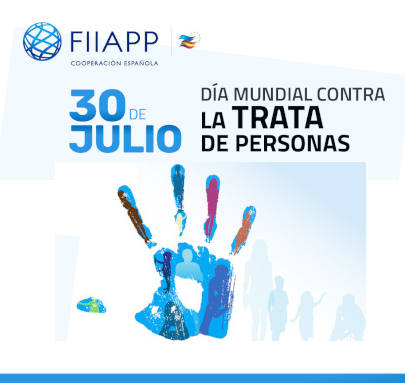-
30 July 2020
Category : Reportage
“The interruption of cooperation would mean a second victimisation for the women and girls who are trafficked”
An expert from the A-TIPSOM project tells us why cooperation is more necessary than ever to fight human trafficking today.

In accordance with the Protocol to the United Nations Convention against Transnational Organised Crime, human trafficking is defined as “the action of capturing, transporting, transferring, welcoming or receiving persons, resorting to the threat or use of force or other forms of coercion, kidnapping, fraud, deception, abuse of power (…) for the purpose of exploitation”. According to this same document, exploitation can take different forms, whether sexual, forced labour or services, practices analogous to slavery, servitude or organ removal.
The current health and food emergency triggered by Covid-19 has increased the vulnerability of potential victims to any type of exploitation, mainly in countries that already had poorly developed infrastructure. The situation of poverty and food shortages provides the ideal scenario for criminal organisations to increase their opportunities to deceive, especially regarding women and girls at risk, offering them false promises of a better job and future.
The coordinator of the A-TIPSOM project in Nigeria, Rafael Ríos, explains how these criminal organisations have used the pandemic crisis as an opportunity to reach and recruit their victims: “90% of the Nigerian population makes a living from street hawking and with the closing of businesses they are unable to carry out this activity. Statistics say that Nigerians survive on less than a euro a day, their mission is to go out onto the street to try to sell something. By making that daily income impossible, they become victims who are much more vulnerable, because they are desperate and they will do anything to earn that money”.
A-TIPSOM is a project funded by the European Union (EU) and managed by FIIAPP, which aims to reduce human trafficking and migrant smuggling in Nigeria and between that African country and the European Union. To achieve this, the project addresses the problem through five main lines known as the five Ps: Politics, Prevention, Protection, Persecution and Partnership.
Humantrafficking rates in Nigeria have become a focus of concern for the international community. In order to eradicate this illegal practice, the Nigerian government launched the National Agency for the Prohibition of Trafficking in Persons (NAPTIP) in 2003 and enacted the Law Against Trafficking in Persons in 2015.
International cooperation, a key tool to eradicate human trafficking
Victims of trafficking are often transferred from one community to another, especially from rural to urban areas and from developing to developed countries through false promises. The involvement in this chain of these criminal networks, which operate from different geographical points, requires joint cooperation between countries in order to effectively combat this type of illegal business.
According to the United Nations, migrants are the group most vulnerable to being exploited and having their lives placed at risk. Every year, thousands of people die of suffocation in containers, perish in the middle of the desert or drown in the sea while being smuggled to another country.
Rafael Ríos points out that cooperation, today more than ever, has become essential: “the interruption of cooperation at this time would mean a second victimisation for the women and girls who are trafficked”. And he adds: “We are talking about female victims who have been trafficked and who have suffered nightmarish situations solely because of their interest in reaching a new destination. Our project not only runs prevention campaigns to make Nigerian women understand what human trafficking is and prevent them from falling into the hands of these networks, but we are also working to improve their living conditions in Nigeria so that they can find a job”.
Human trafficking and irregular migration prosper when there is a lack of sustainable preventive measures. The Citizens’ Association to combat trafficking in human beings and all forms of gender violence (ATINA), warns that in order to prevent human trafficking, attention must first be paid to the causes that lead to this situation.Traffickers tend to exploit and take advantage of the needs of potential victims, whether they are basic needs, such as housing and food, or emotional needs, such as love and belonging. Ríos points out that improving the living conditions of the victims is a key factor since it obviates the need for them to emigrate to another country, putting their lives at risk in doing so.
The cross-border dimension of the problem adds an extra complexity that requires it to be addressed by multiple agencies, both governmental and international, to coordinate a response with a multidisciplinary approach that covers criminal justice, human rights, investment and development.
On World Day against Trafficking in Persons, FIIAPP ratifies its support and commitment to cooperation in the fight against organised crime that impedes the development of countries and puts the lives of the most vulnerable people at risk.
The views and opinions expressed in this blog are the sole responsibility of the person who write them.






